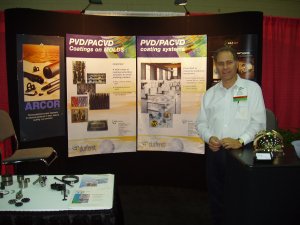.jpg)
AZoM conducted a series of interviews at the MS&T 07 trade exhibition in Detroit between September 17 and 18. Here's what one of the exhibitors had to say when asked about their latest developments, products and technologies.
Interviewee: Michael Wright, Manager Nitriding Sales and Service, H.E.F. USA
Interviewer: Cameron Chai, AZoM
AZoM: It’s Cameron Chai here from azom.com reporting from the MS&T Trade Show in Detroit and I’ve got with me now Michael Wright from H.E.F. USA. How are you going, Michael?
H.E.F. USA: I’m fine.
AZoM: How’s the trade show going for you so far?
H.E.F. USA: The trade show’s not bad. A little slow at the end of the day, the second day, but that’s normal.
AZoM: So you’ve got lots of sales leads and things like that so far?
H.E.F. USA: I think we’ve got an adequate number. The key is getting selected leads, leads that’ll pay off, but I think we’ve got a good number.
AZoM: Good to hear. So tell me Michael, what do HEF do?
H.E.F. USA: We specialise in surface treatments and coatings that address problems with wear and friction in the automotive, aerospace and other industries.
AZoM: So just for anybody who might not know, what’s the difference between a coating and a surface treatment?
H.E.F. USA: Surface treatment in this case would be something where we diffuse … a thermochemical diffusion treatment that would create a compound out of an existing surface, compared to a deposition coating where you’re actually putting something on the surface to provide the properties that you want.
AZoM: So you guys provide both types of materials for surfaces?
H.E.F. USA: Both type of processes. We either perform the process for you, or we can provide the technology to you to perform the process yourself.
AZoM: So are you saying that you actually licence or sell the technology as well as providing materials and products?
H.E.F. USA: That’s exactly right. We do this world wide, not just in North America. We’re a global group based out of France, but the US operations specialises mostly in three areas, and those are the deposition coatings as you mentioned, the diffusion coatings or processes or treatments, and also specialised bushings for the heavy equipment industry.
AZoM: And so what sort of materials do you use for coatings, what materials do you deposit?
H.E.F. USA: We deposit very thin, hard coatings like titanium nitride, titanium aluminium boride, and various combinations of metals and metal nitrides for the purpose of improving wear and friction.
AZoM: And before you were telling me about a process that you use to create some of these bushings, that was ..?
H.E.F. USA: Well the bushings themselves are custom designed by our group and especially for the heavy equipment industry, in particular for applications where you’ve got high loads, low rotations, and very harsh environments. People like Caterpillar, Case New Holland, John Deere, people like that are large users of such bushings.
AZoM: Sounds like a good field to be in and it sounds like there’s lots of quality customers there and I feel that, an area where they need lots of solutions?
H.E.F. USA: Yes, we think we had a lot of success in that area. Most recently of course the bushings as you said, a very large growth area for us in the US. But also in the area of the thermochemical diffusion treatments, a very large growth area for us is the replacement of chrome plating which world wide has become an environmental problem and we’ve been able to address that successfully with this process.
AZoM: Great to hear. Everybody … there’s a few people out here who have tried, who are doing things about … with chrome and things like that, trying to replace chrome, lots of chrome analysis type techniques around the various stands I’ve seen. So it’s good to hear that there’s more people reacting to that environmental need.
H.E.F. USA: Yeah, actually it’s a growing need. As many in the industry know, chrome has become a big environmental problem. It can be dealt with but not easily and it’s becoming more and more expensive. Processes such as ours, in particular the thermochemical diffusion process is an ideal replacement for it because it’s less expensive, it performs better and it does not have the environmental problems associated with hard chrome.
AZoM: Great to hear. Alright Mike, thanks for spending a few minutes with us and all the best for the rest of the trade show.
H.E.F. USA: Thanks very much.
